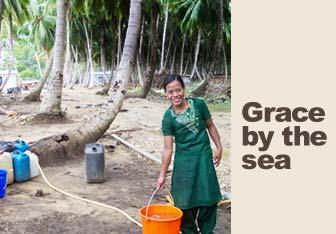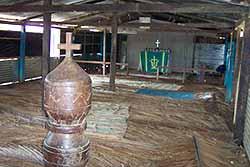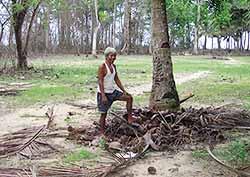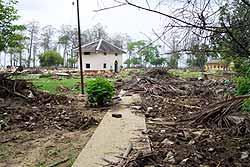
The Vengaboys would exult in Hut Bay, Little Andaman.
Long after remixed Bollywood songs edged them off the Indian music scene, We're going to Ibiza blares out of a tape recorder in John Joseph's tribal home as he has his morning cup of tea.
Little Andaman, a small island in the Andaman and Nicobar group of islands, was destroyed in the tsunami but in spite of the destruction it has a laconic, faraway charm that is pleasantly unique.
At 7 am, we arrive announced at a temporary shelter and are politely led into John's tin shed which serves as the family's temporary home. Hot tea is served while in the courtyard behind, kids and elders brush their teeth.
It's awkward to land up at a stranger's doorstep at such an early hour. Worse to ask them about a killer wave that flattened their little Nicobarese village in an area bearing an uncharacteristic Sikh name -- Harminder Bay.
But then, Andaman and Nicobar, is unique. Even the airline code for Port Blair is a trifle different -- IXZ.
The people here, especially tribals, bear their loss with a quiet dignity. No volatile outbursts against the government; no skirmishes with neighbours for aid that one encountered aplenty on the Tamil Nadu coast, the other part of India defiled by the tsunami.
Here, the tribal captains do most of the speaking for their people.
Elected from the tribe, they are the liaison with the government officials and are directed to when unannounced visitors come calling at weird hours.
Sitting under a polio awareness poster featuring Amitabh Bachchan [Images] and Shah Rukh Khan [Images], John Joseph gives us a brief backgrounder:
1,300 people live in the temporary shelter, school has started, the makeshift church is being constructed by residents, an NGO gives the workers Rs 100 per day for labour, he became first captain last year etc, etc�
Musa Haquim, a white haired elderly man clad in a vest and shorts who is a silent observer in the shed, takes over from there, leading us towards the beach. His cheerful, easy going style makes it hard to believe that he and his village scrambled through the same path to save themselves from the tsunami last December.
 One of the two Muslim families in an all Christian village, Musa postpones his trip to the market to walk us to where his village had previously stood.
One of the two Muslim families in an all Christian village, Musa postpones his trip to the market to walk us to where his village had previously stood.
Past coconut trees and tall grass reminiscent of the television series Lost, he along with another young lad, Zakaria Nichodemus, points to broken race canoes and family owned coconut trees en route.
Coconut, the main occupation of the tribal folk, was badly hit. In better times they sold dried coconuts to the mills for Rs 26 a kilo. Working three days a week they would sell around 100 kgs a week. Now, it is a different story. Hectare after hectare of coconut plantation had been uprooted or mowed down.
"I didn't have any coconut trees," says Zakaria who dropped out of class X and hopes to get a job as a driver in the capital Port Blair. "I lost my driving license in the tsunami, once it is reissued I'll leave."
Zakaria works as a volunteer with an NGO working in their camp. He says most students here do not study beyond class X and have never left the Andaman and Nicobar islands.
"I did," interrupts Musa, "I went to Delhi to play for the Subroto Cup as a student and almost died in the bitter winter. You see we do not know cold weather here."
Throughout the three islands we visited, there was one common thread that united the Nicobarese -- sport.
If there was one thing they really missed as they settled into makeshift homes were their playgrounds.
"Our playground is gone and we don't even have carrom boards or rackets. No television, newspaper, no books, we just talk," says Musa.
 And then he stops, beside a coconut tree. "This was my house."
And then he stops, beside a coconut tree. "This was my house."
Nothing exists at the location. Only rubble, remains of somebody's clothes and an old well that had withstood the tsunami. Musa wants his picture taken alongside the tree and poses with a smile. Nothing on his face or gesture reflects any sadness on a loss that would make the lives of the best of men come crashing down.
This is the most striking part of the people here. Whether it is their reluctance to speak their mind to strangers or their bond with their native land, the Nicobarese do not dwell on their grief or loss.
A girl who takes us to her shelter to show the relief material that the government had given her family said she wants to be resettled where her village once stood. But it wasn't to be because it was right on the beach.
The new village would be further away to protect them from the vagaries of the sea.
"Our graveyard was also destroyed and people say they found skeletons and bones of the dead in the rubble. So the captain has said it is a bad omen which means it is not good for us to go back."
 Devout Christians, the people of Harminder Bay also lost their church to the tsunami. Past a thicket of trees, its white cross still standing on the only remaining wall, under which a pig and her newly born piglets had found refuge.
Devout Christians, the people of Harminder Bay also lost their church to the tsunami. Past a thicket of trees, its white cross still standing on the only remaining wall, under which a pig and her newly born piglets had found refuge.
Zakaria says most people in the village were married here. And that in the joint family system prevalent on the island, the bride and groom could either choose to live with their mother or father's family.
On the way back from the shore, he points to the bright red stall shops donated by a voluntary group to assist in the people's recovery. Others earn daily wages from reconstruction work. Those whose coconut trees had survived are thankful that nature spared them from its fury.
At a time when the tsunami destroyed their village and altered their lives, the people here do not complain and cope with their loss with remarkable grace.
And that is what set this village at the edge of Hut Bay so apart.
Photographs: Archana Masih